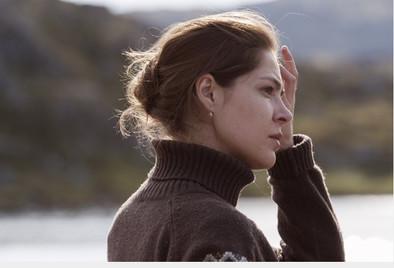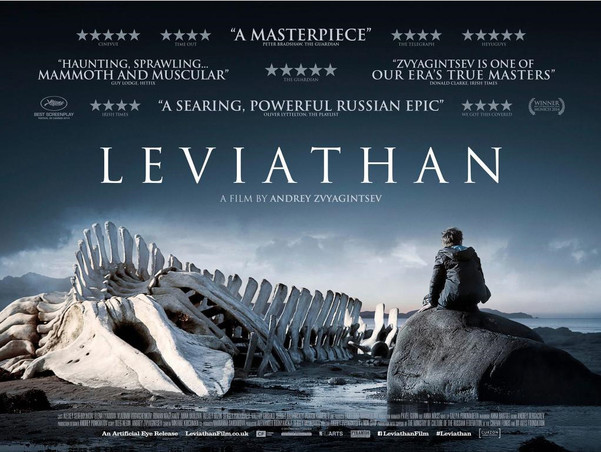
CAST & CREW
Featuring Aleksey Serebryakov, Elena Liadova,
and Vladimir Vdovichenkov
Directed by Andrey Zvyagintsev
Written by Oleg Negin and Mr. Zvyagintsev
In Russian, with English Subtitles
Rated R Running time: 141 minutes
Featuring Aleksey Serebryakov, Elena Liadova,
and Vladimir Vdovichenkov
Directed by Andrey Zvyagintsev
Written by Oleg Negin and Mr. Zvyagintsev
In Russian, with English Subtitles
Rated R Running time: 141 minutes
Reviewed by Michael Phillips - Chicago Tribune
A grand, brooding Russian crime drama set in a corner of the world you likely haven't seen, "Leviathan" is about an ordinary man taking on a dirty town that Dashiell Hammett or James M. Cain would've been proud to call home.
The machinations of co-writer and director Andrey Zvyagintsev's film consciously recall the book of Job as well as philosopher Thomas Hobbes' mid-17th-century treatise, from which this film takes its title. Yet "Leviathan" also swims in a sea of 20th- and early 21st-century pulp fiction. Winner of the screenplay award at the 2014 Cannes film festival, it's like a northern Russian version of "The Wire," poking around various cesspools of corruption while maintaining a steady, watchful gaze on a dangerous romantic triangle.
Kolya is a heavy-drinking auto mechanic who lives with his son from a previous marriage and Kolya's second wife in a small fishing village near the Arctic Ocean. His house, shabby but light-filled when the weather cooperates, sits above an inlet, not far from the skeletons of whales on the beach. He is the third generation in his family to live there.
But not for long if the forces in power have their way. The town is led by a craven pig of a mayor who has plans for the land that involve paying Kolya a few hundred thousand rubles (roughly $10,000 in U.S. currency) and getting him out of the way. The mechanic does not like the offer. "Leviathan" is about what happens when the man stares down the machine to see who will blink first.
Kolya's friend and ally comes from Moscow: He is Dimitri, a confident, smiling lawyer who is also having an affair with Kolya's wife, Lilya. As Dimitri confronts the mayor, threatening to expose some political secrets if Kolya doesn't get better treatment, the movie tightens the noose around the characters, none of whom is entirely innocent.
It's a small story set in a memorably desolate location. The actors, all quite magnificent, enlarge it, just as cinematographer Mikhail Krichman illuminates the vistas and roadways and even the furtive kitchen table glances between clandestine lovers. There's a strong streak of black comedy running through "Leviathan," as when Kolya endures a near-endless spiel of rapid-fire legalese spoken by an official during his first court hearing. In a darker vein, Kolya's troubled son, Roma, wonders what happened to his birth mother, who his father's new wife is, really, and where he fits into the scenario.
Alexey Serebryakov plays Kolya like a wounded bull of a man, fueled by vodka and rage. Elena Lyadova's Lilya recalls the young Lena Olin in her crosscurrents of yearning and disillusionment. The puffy, exasperated face of Roman Madyanov, who plays Vadim, the mayor, becomes an emblem of modern Russia's more ruthless instincts.
"I don't like it," the Russian culture minister said last year of "Leviathan," which was co-written by Oleg Negin. Even so, Zvyagintsev managed to finance the project with state money. Some momentum is lost in the latter sequences, when the audience knows full well what's happening in advance of the more naive characters. Nonetheless, this is quite a film, one that takes a story of American origin (in Colorado, an angry citizen who lost a zoning dispute with the law fought back, destructively) and places it in an entirely new context. Modern Russia, as one priest puts it in the film, is "reawakening the soul" of its people. In "Leviathan," Kolya wakes up, all right, to all sorts of realizations. In the end he's left with the biggest question of all: Am I alone here?
A grand, brooding Russian crime drama set in a corner of the world you likely haven't seen, "Leviathan" is about an ordinary man taking on a dirty town that Dashiell Hammett or James M. Cain would've been proud to call home.
The machinations of co-writer and director Andrey Zvyagintsev's film consciously recall the book of Job as well as philosopher Thomas Hobbes' mid-17th-century treatise, from which this film takes its title. Yet "Leviathan" also swims in a sea of 20th- and early 21st-century pulp fiction. Winner of the screenplay award at the 2014 Cannes film festival, it's like a northern Russian version of "The Wire," poking around various cesspools of corruption while maintaining a steady, watchful gaze on a dangerous romantic triangle.
Kolya is a heavy-drinking auto mechanic who lives with his son from a previous marriage and Kolya's second wife in a small fishing village near the Arctic Ocean. His house, shabby but light-filled when the weather cooperates, sits above an inlet, not far from the skeletons of whales on the beach. He is the third generation in his family to live there.
But not for long if the forces in power have their way. The town is led by a craven pig of a mayor who has plans for the land that involve paying Kolya a few hundred thousand rubles (roughly $10,000 in U.S. currency) and getting him out of the way. The mechanic does not like the offer. "Leviathan" is about what happens when the man stares down the machine to see who will blink first.
Kolya's friend and ally comes from Moscow: He is Dimitri, a confident, smiling lawyer who is also having an affair with Kolya's wife, Lilya. As Dimitri confronts the mayor, threatening to expose some political secrets if Kolya doesn't get better treatment, the movie tightens the noose around the characters, none of whom is entirely innocent.
It's a small story set in a memorably desolate location. The actors, all quite magnificent, enlarge it, just as cinematographer Mikhail Krichman illuminates the vistas and roadways and even the furtive kitchen table glances between clandestine lovers. There's a strong streak of black comedy running through "Leviathan," as when Kolya endures a near-endless spiel of rapid-fire legalese spoken by an official during his first court hearing. In a darker vein, Kolya's troubled son, Roma, wonders what happened to his birth mother, who his father's new wife is, really, and where he fits into the scenario.
Alexey Serebryakov plays Kolya like a wounded bull of a man, fueled by vodka and rage. Elena Lyadova's Lilya recalls the young Lena Olin in her crosscurrents of yearning and disillusionment. The puffy, exasperated face of Roman Madyanov, who plays Vadim, the mayor, becomes an emblem of modern Russia's more ruthless instincts.
"I don't like it," the Russian culture minister said last year of "Leviathan," which was co-written by Oleg Negin. Even so, Zvyagintsev managed to finance the project with state money. Some momentum is lost in the latter sequences, when the audience knows full well what's happening in advance of the more naive characters. Nonetheless, this is quite a film, one that takes a story of American origin (in Colorado, an angry citizen who lost a zoning dispute with the law fought back, destructively) and places it in an entirely new context. Modern Russia, as one priest puts it in the film, is "reawakening the soul" of its people. In "Leviathan," Kolya wakes up, all right, to all sorts of realizations. In the end he's left with the biggest question of all: Am I alone here?






